Music History, Is Black History
In honor of Black History Month 2021, Reverb celebrates the innovations, contributions, and groundbreaking achievements of Black musicians throughout history.
Watch the Video
Music History, Is Black History
In honor of Black History Month 2021, Reverb celebrates the innovations, contributions, and groundbreaking achievements of Black musicians throughout history.
Watch the Video
For the Innovators,
Chart-Toppers,
Unsung Heroes,
and Those Up Next
For the Innovators,
Chart-Toppers,
Unsung Heroes,
and Those Up Next
Celebrating Black Excellency
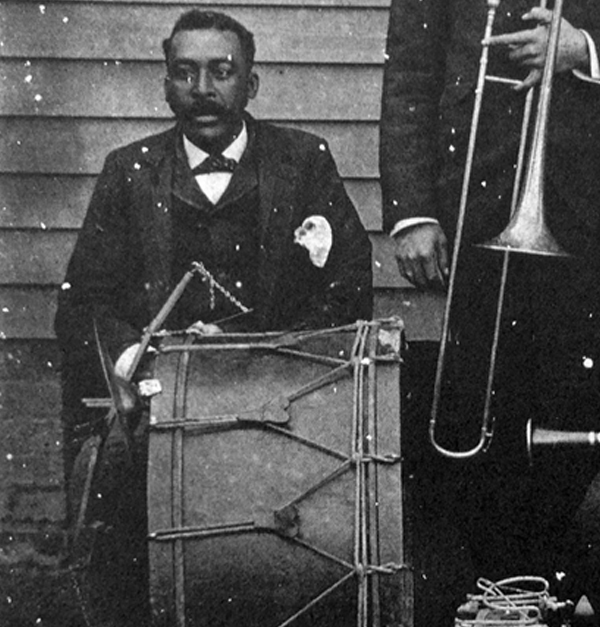
1894-'95
Drummer Edward "Dee Dee" Chandler, with a self-made kick drum pedal, popularizes the idea of the drum set in New Orleans.
Learn More
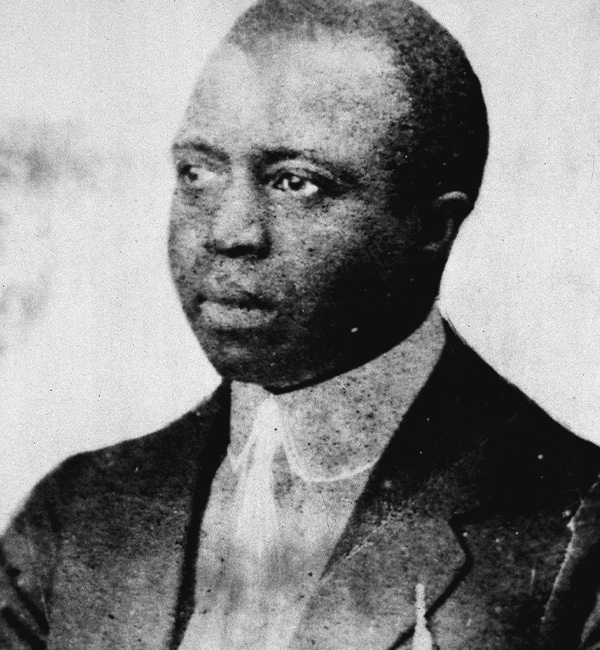
Scott Joplin (1900). Photo by: MPI / Stringer, Getty Images.
1899
Scott Joplin publishes "Maple Leaf Rag," the first major ragtime hit. Joplin posthumously received a Pulitzer Prize in 1976.
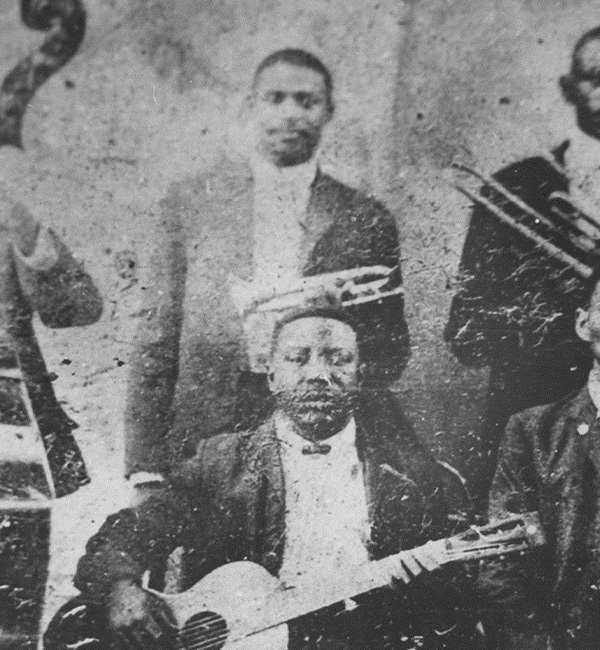
1900
New Orleans cornetist Buddy Bolden's loud and improvisational style of playing leads to a new genre: jazz.
Learn More
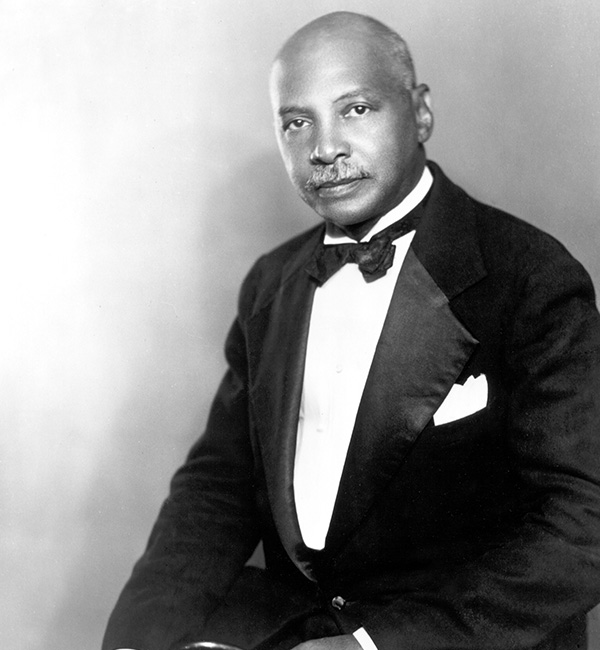
W.C. Handy (1970). Photo by: Michael Ochs Archives / Stringer, Getty Images.
1912
W.C. Handy, self-proclaimed "Father of the Blues," publishes his first composition, "Memphis Blues," in the 12-bar style.
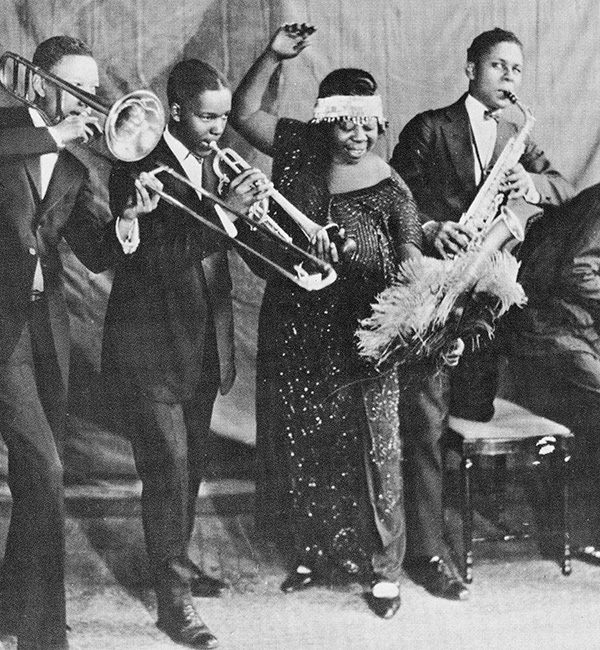
Ma Rainey (1924). Photo by: Michael Ochs Archives / Stringer, Getty Images.
1923
"Mother of the Blues" Ma Rainey makes the first of more than 100 recordings for Paramount.
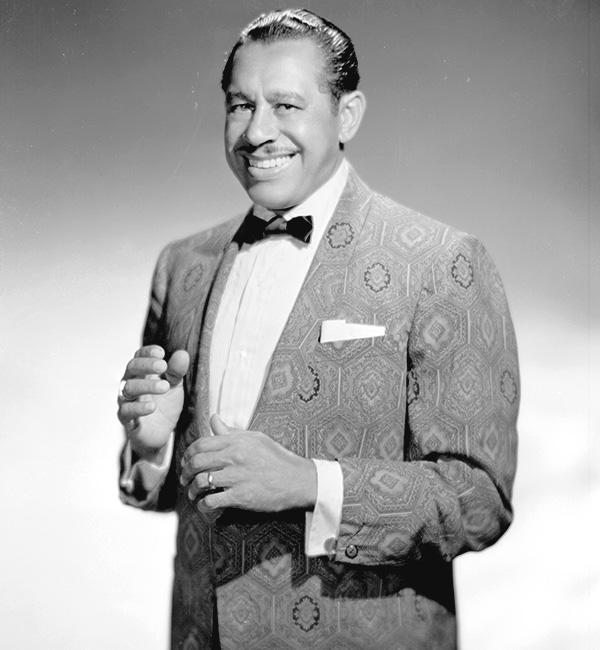
Cab Calloway (1970). Photo by: Michael Ochs Archives / Stringer, Getty Images.
1931
Cab Calloway becomes the first Black person to sell a million copies of a single song with "Minnie the Moocher."
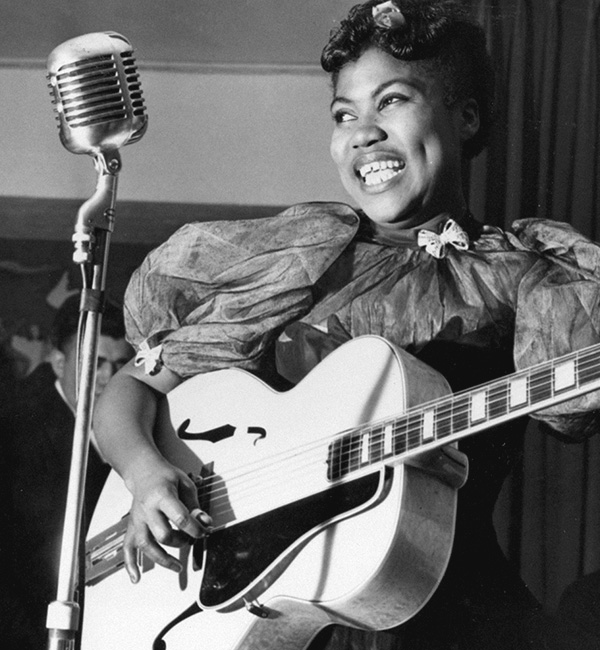
Sister Rosetta Tharpe (1938). Photo by: Michael Ochs Archvies / Stringer, Getty Images.
1938
Guitarist and singer Sister Rosetta Tharpe records for the first time, releasing "Rock Me" and paving the way for rock 'n' roll.
Learn More
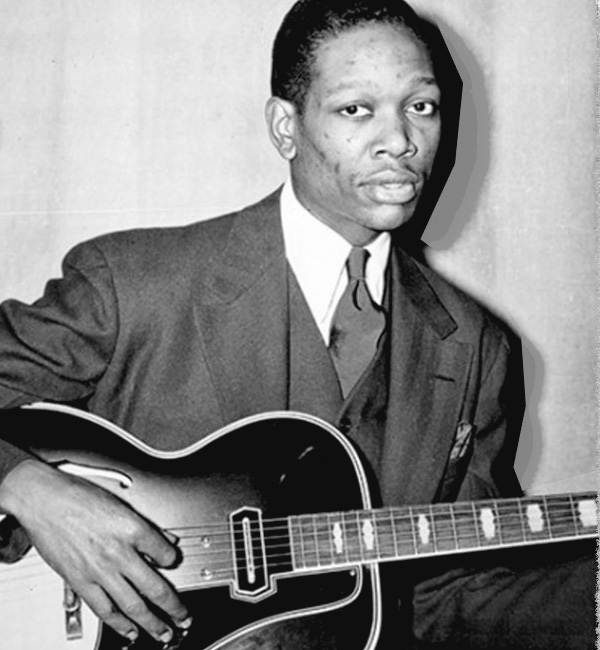
1939
Charlie Christian joins Benny Goodman's band. His lead guitar playing sets the template for electric guitar solos to come.
Learn More
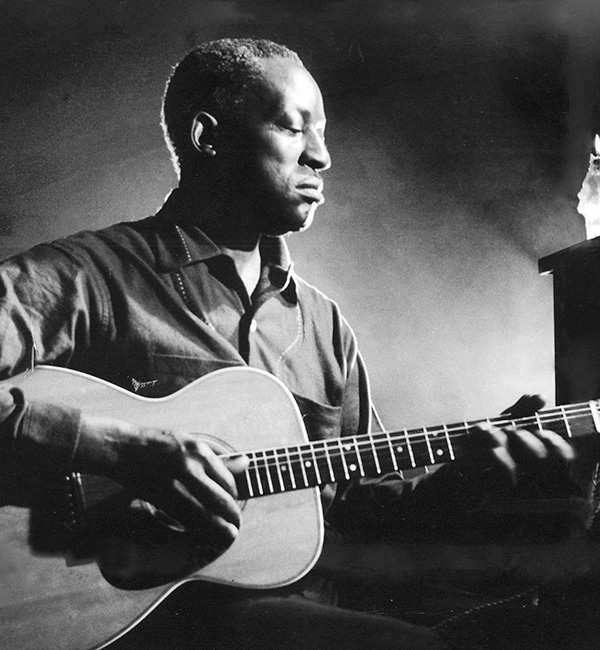
Big Bill Broonzy (1970). Photo by: Michael Ochs Archives / Stringer, Getty Images.
1942
On Roosevelt Sykes' "You Can't Do That to Me" and "Sugar Babe Blues," Big Bill Broonzy puts to wax the first recorded use of tremolo on guitar.
Learn More
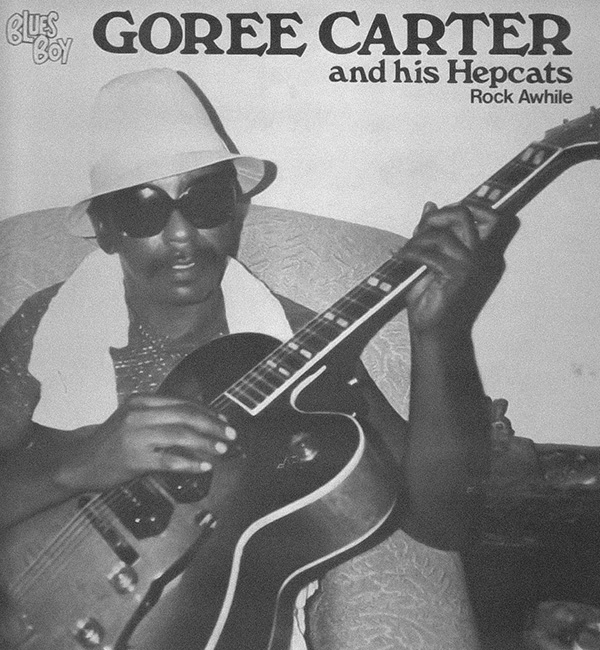
1949
Goree Carter releases "Rock Awhile," considered one of the first true rock 'n' roll songs thanks to its distorted electric guitar tone. It arrived two years before "Rocket 88."
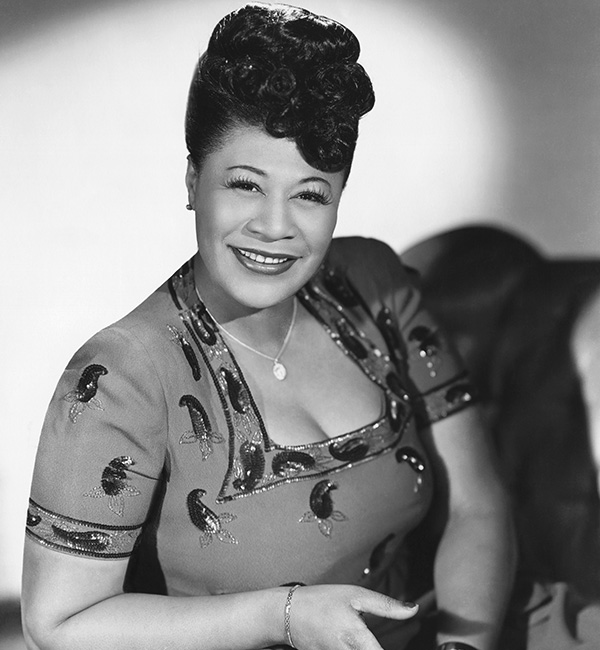
Ella Fitzgerald (1945). Photo by: Michael Ochs Archives / Stringer, Getty Images.
1959
Famed jazz singer Ella Fitzgerald and composer Count Basie become the first African Americans to win Grammys (and both in fact win two awards the same night).
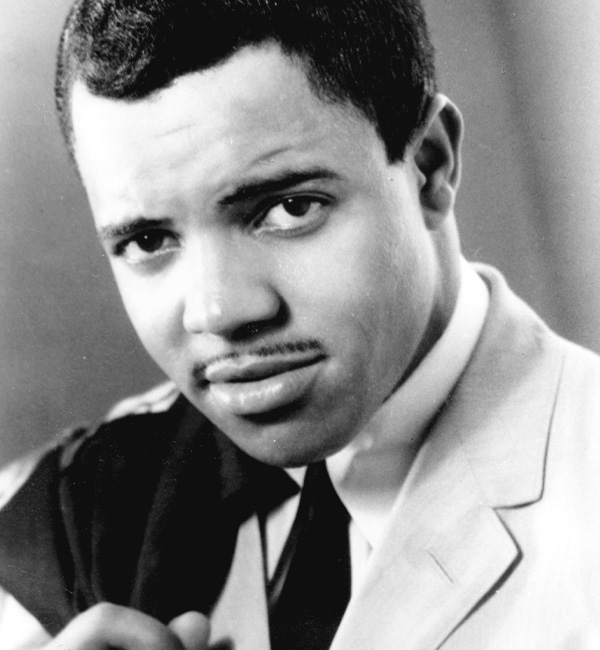
Berry Gordy Jr. (1958). Photo by: Michael Ochs Archives / Stringer, Getty Images.
1959
Berry Gordy Jr. establishes Motown Recording Corporation (originally called Tamla Records), which soon defined "The Sound of Young America."
Learn More
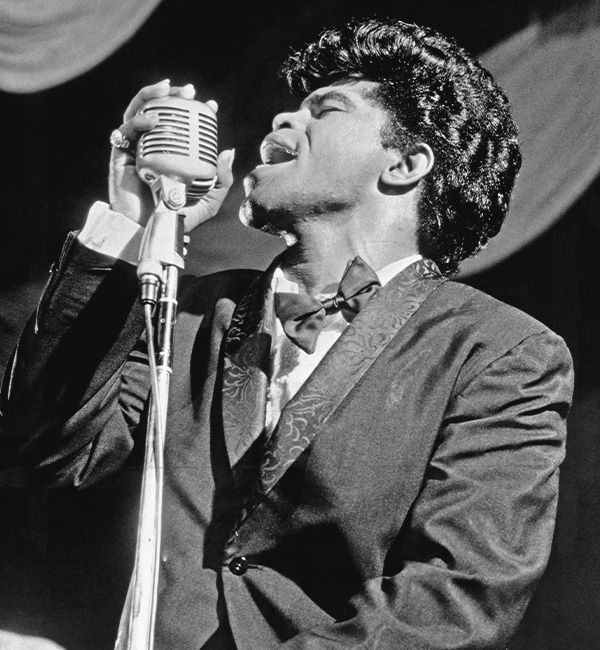
James Brown (1962). Photo by: Michael Ochs Archives / Stringer, Getty Images.
1965
James Brown's "Papa's Got a Brand New Bag" brings his downbeat funk to the top of the charts. "I Got You," "Cold Sweat," and harder funk soon followed.
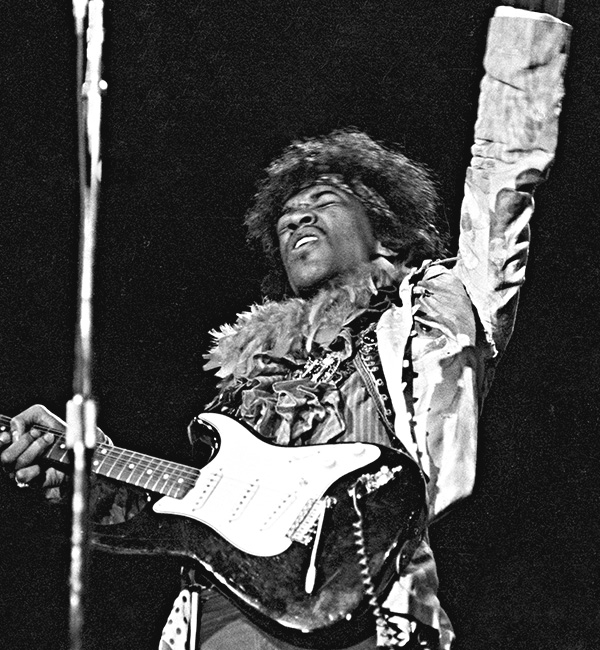
Jimi Hendrix (1967). Photo by: Michael Ochs Archives / Stringer, Getty Images.
1966
Jimi Hendrix acquires his first Fuzz Face, using it on stage and during the recording of Are You Experienced?
Learn More
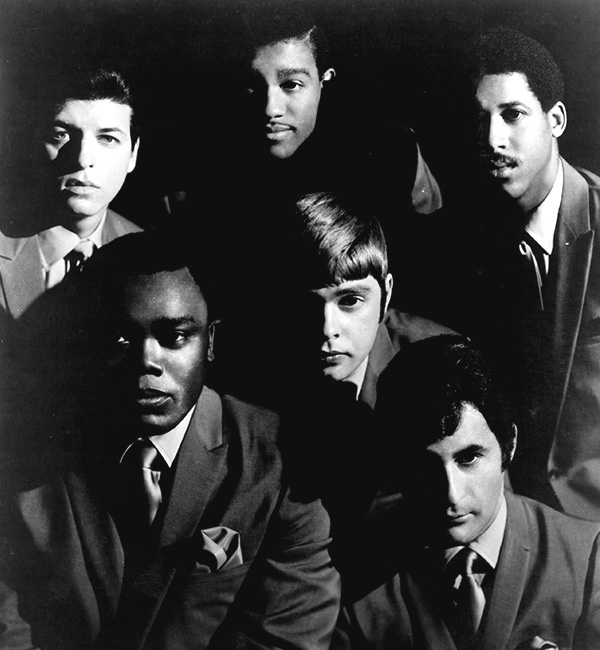
The Winstons (1970). Photo by: Michael Ochs Archives / Stringer, Getty Images.
1969
The Winstons' drummer Gregory Coleman plays a 6-second break on the B-side "Amen, Brother." This "Amen" break would become a foundational sample to hip-hop, jungle/drum-and-bass, and other electronic music genres.
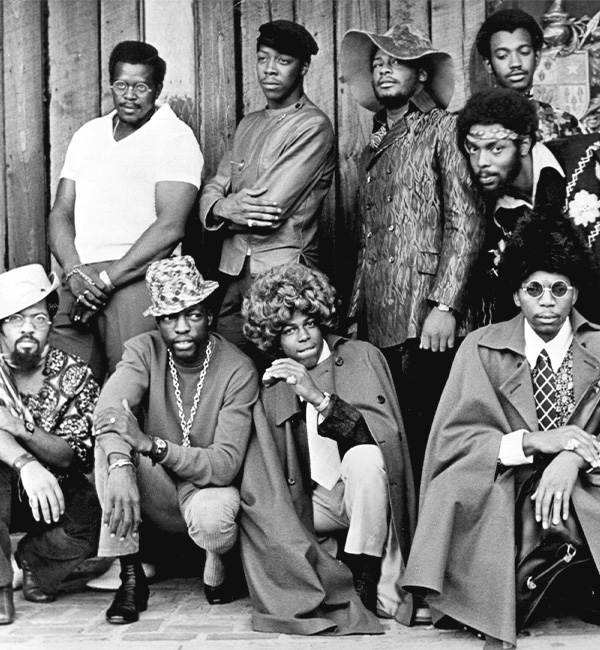
Parliament-Funkadelic (1970). Photo by: Michael Ochs Archives / Stringer, Getty Images.
1970
George Clinton’s Funkadelic releases its debut self-titled record, which doubles as the first official record of the Parliament-Funkadelic collective. (Bootsy Collins' Space Bass would debut in '75.)
Learn More
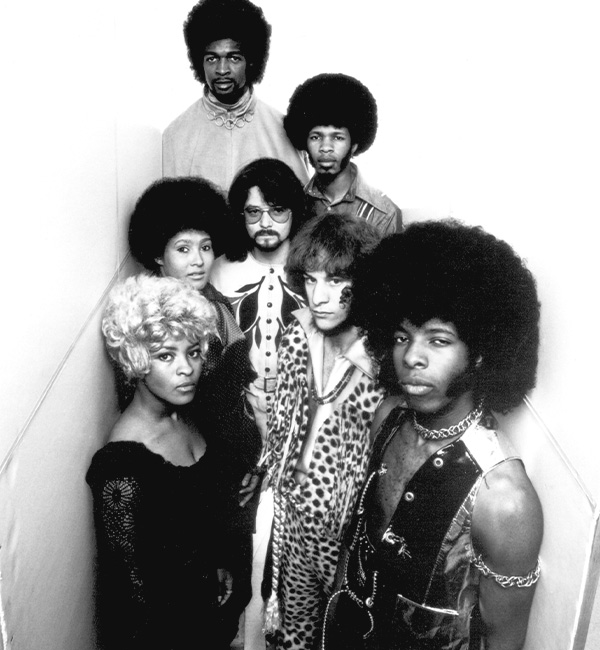
Sly & The Family Stone (1969). Photo by: Michael Ochs Archives / Stringer, Getty Images.
1971
Sly & The Family Stone's "Family Affair" is the first hit chart-topper to be built on a drum machine's backing rhythm, thanks to Sly's use of the Maestro Rhythm King MRK-2.
Learn More
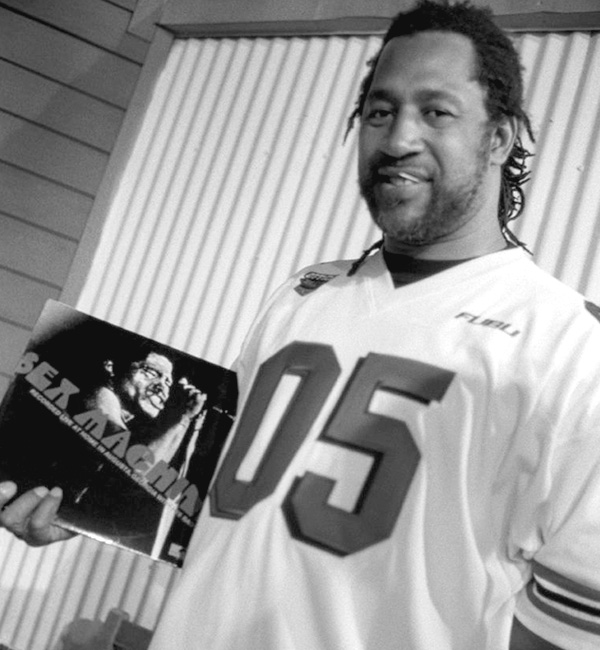
DJ Kool Herc (1999). Photo by Mika Väisänen / WikiMedia Commons.
1973
DJ Kool Herc throws his first block party in the Bronx. Herc purposely looped sections of records to extend the drum breaks. The innovation is widely considered to have led to the beginning of hip-hop.
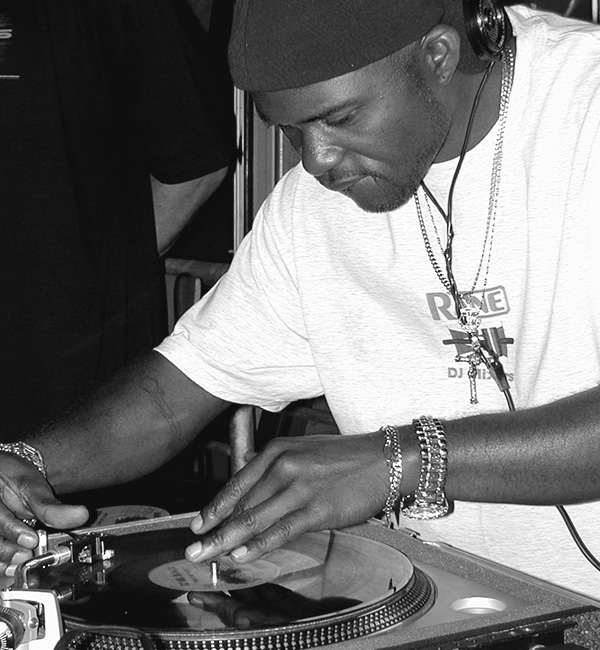
Grand Wizzard Theodore (2002). Photo by FlintMI / WikiMedia Commons.
1975
At the age of 13, Grand Wizzard Theodore accidentally discovers the turntable technique that would ultimately become known as scratching, a sound that became a staple in hip-hop and appeared in tracks across genres.
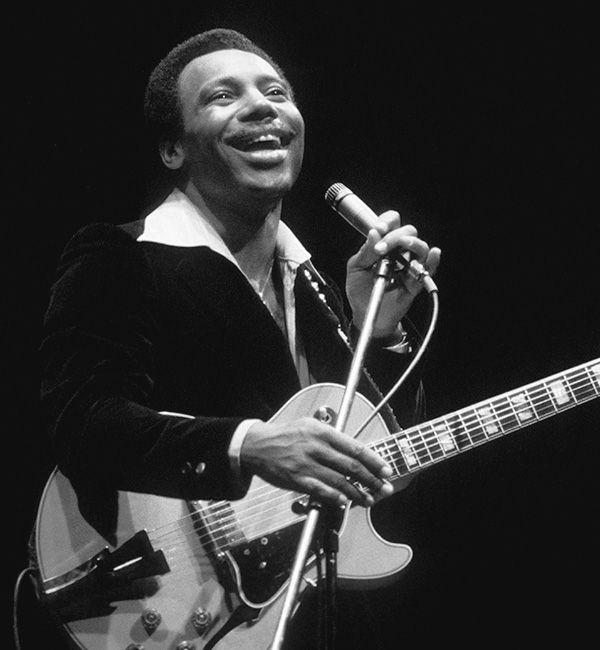
George Benson (1978). Photo by: David Redfern / Staff, Getty Images.
1977
Ibanez releases the George Benson Signature, the first signature guitar for a Black artist to be put into production.
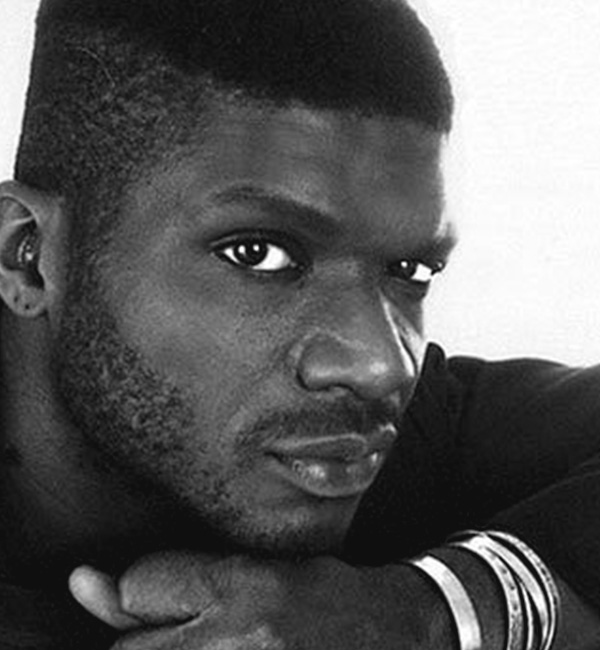
DJ Larry Levan. Photographer Unknown.
1978
DJ Larry Levan co-designs an expansive sound system for the Paradise Garage, complete with a "Levan Horn," where his innovative mixes helped birth modern dance music.
Learn More
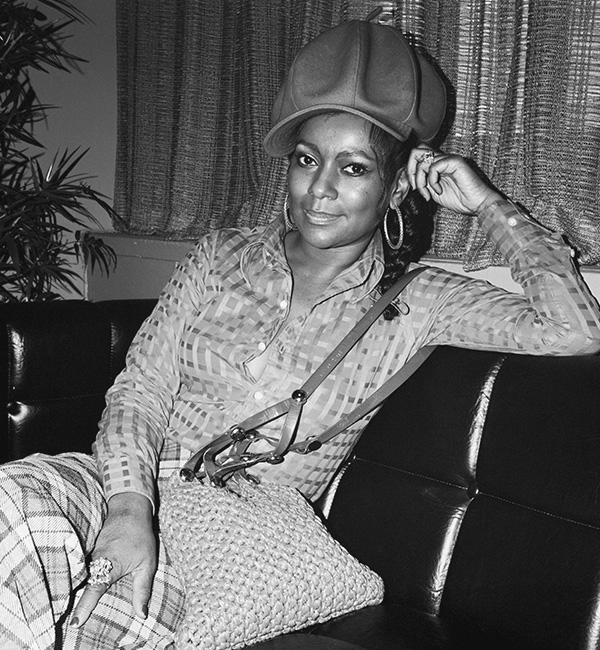
Sylvia Robinson (1973). Photo by: Michael Ochs Archives / Stinger, Getty Images.
1979
Sylvia Robinson and husband Joe Robinson launch Sugar Hill Records. Thanks to the label's hits like "Rapper's Delight" and "The Message," Sylvia became known as "The Mother of Hip-Hop."
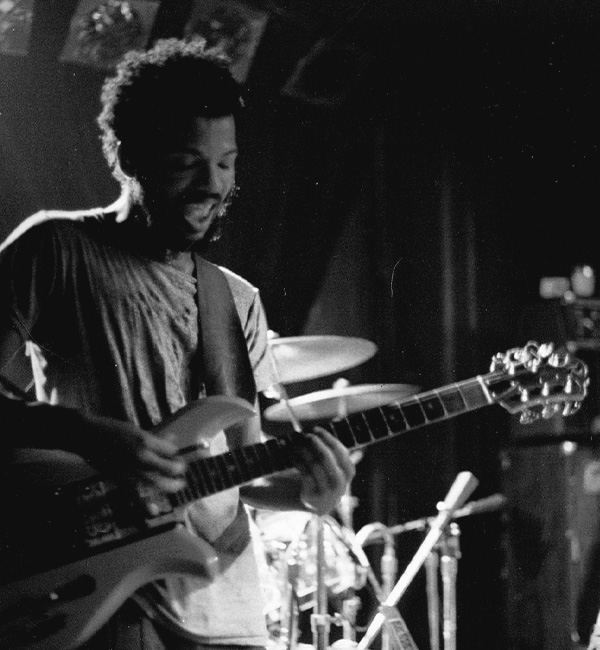
Bad Brains (1983). Photo by Malco23 / WikiMedia Commons.
1982
DC band Bad Brains release its self-titled debut album, which is considered one of the first hardcore punk records. Bad Brains also helped the integration of reggae and punk music, later seen in bands like Sublime and 311.
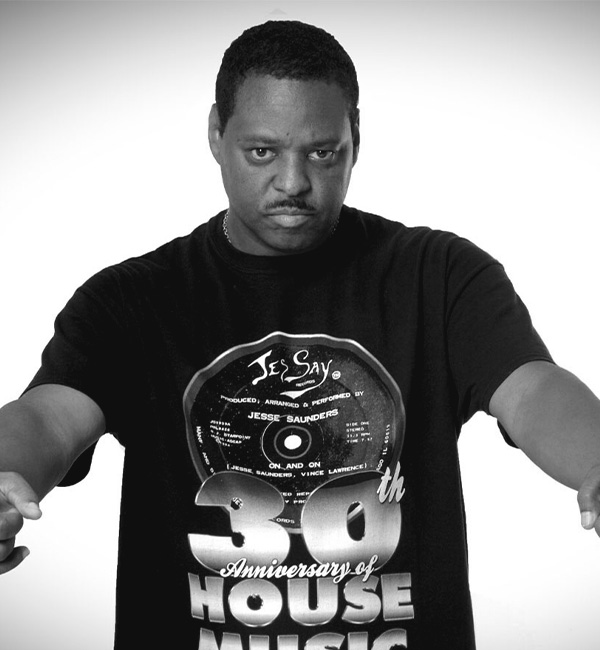
Jesse Saunders. Photo by: Music Artist Connection.
1984
Jesse Saunders records what is arguably the first house song, "On and On." House emerged in Chicago as an evolution of disco, and its prevalence in popular music stands to this day.

Lauryn Hill (1999). Photo by: Scott Gries / Staff, Getty Images.
1999
The Miseducation of Lauryn Hill is the first hip-hop record to win the Grammy Award for Album of the Year.

Kendrick Lamar (2017). Photo by: Kevin Winter / Staff, Getty Images.
2017
Kendrick Lamar wins the Pulitzer Prize for Music for his album Damn. Lamar was the first non-classical or -jazz artist to receive the award.
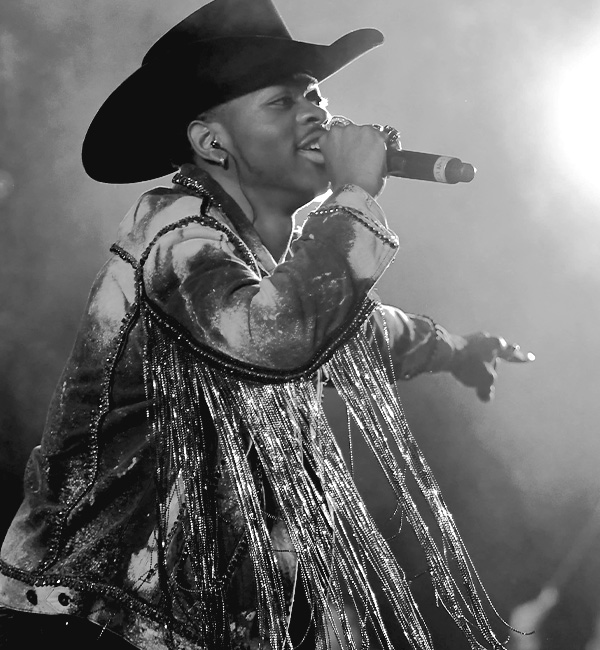
Lil Nas X (2019). Photo by: Matt Winkelmeyer / Staff, Getty Images.
2019
Columbia Records re-releases Lil Nas X’s country-rap crossover "Old Town Road." The track held the No. 1 spot of the Billboard Top 40 for 19 consecutive weeks, the longest time a song has held that position since the chart’s creation in 1958.

Why "Music History, Is Black History?"
The impact of Black artistry on popular culture ranges from the publicized feats of chart-topping popular artists to the innovators whose names are lost to time. To celebrate music history, to celebrate gear, is to recognize the continuing influence of Black artists in popular culture and beyond.
Why "Music History, Is Black History?"
The impact of Black artistry on popular culture ranges from the publicized feats of chart-topping popular artists to the innovators whose names are lost to time. To celebrate music history, to celebrate gear, is to recognize the continuing influence of Black artists in popular culture and beyond.
Celebrating Not Just Today But Every Day
Reverb celebrates Black artists and gear innovators not just in February, but every day. From rising artists and historical vanguards to the unsung heroes whose contributions have flown under the radar for far too long. This celebration isn’t the end all be all and we encourage you to do your part and dig into history as well.
What’s Next?
There’s still work to be done in elevating the work and innovations of Black artists, gear innovators, and small businesses. While we continue research to figure out the best way to provide support, our social impact initiative, Reverb Gives, helps provide underserved youth music education programs with the gear they need to make music.
What's Next?
There’s still work to be done in elevating the work and innovations of Black artists, gear innovators, and small businesses. While we continue research to figure out the best way to provide support, our social impact initiative, Reverb Gives, helps provide underserved youth music education programs with the gear they need to make music.
From the work of AFRORACK’s Aaron Guice who helps introduce young adults to the world of modular synthesis in Chicago, to Rashard Dobbins of Class Act Detroit providing outlets to learn beat-making and studio production, to the work of Elliot Gann and Today’s Future Sound, we’re committed to helping provide gear for the next generation of musicians and figuring out how best to boost those who need it most.
Music History, is Black History.
Here’s to those who came before, and to those up next.
Music History, Is Black History
Here’s to those who came before, and to those up next.